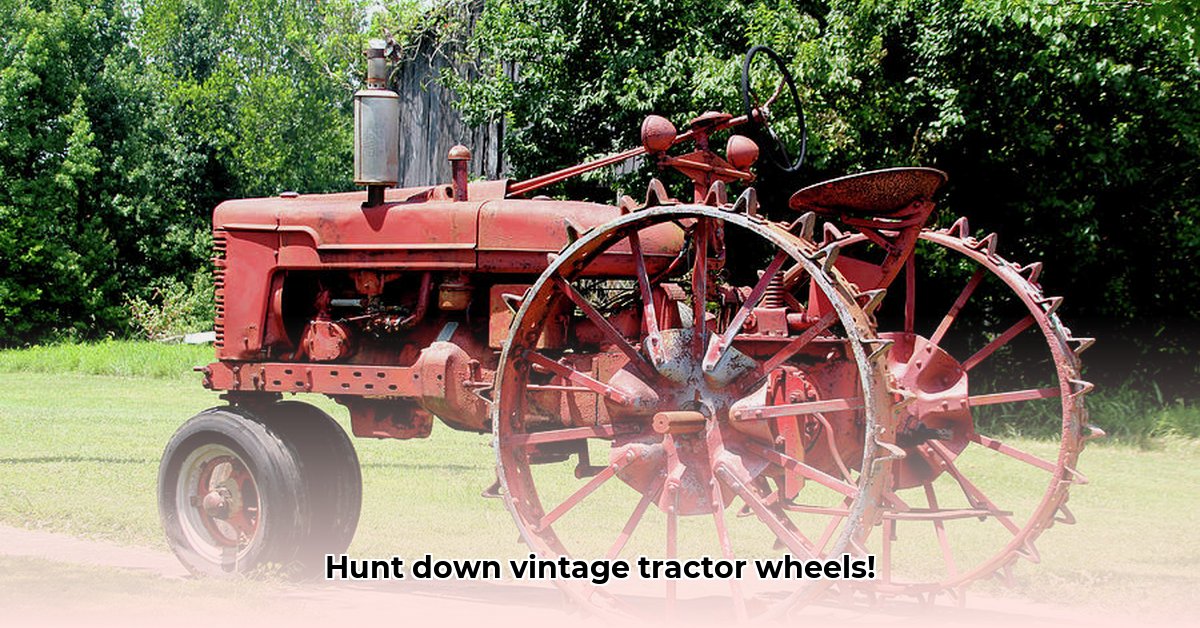
Finding and restoring antique steel tractor wheels is a rewarding blend of history, restoration, and treasure hunting. This comprehensive guide will equip you with the knowledge and skills to successfully navigate this unique hobby, whether you're a seasoned collector or just starting out. For additional resources, check out this helpful website.
Identifying and Evaluating Antique Steel Tractor Wheels
Before you even begin your search, it's crucial to understand how to identify and evaluate these wheels. This will help you avoid costly mistakes and ensure you're investing your time and resources wisely.
Maker's Marks & Dimensions: Start by searching for manufacturer's marks—often stamped or cast into the metal—that identify the maker (e.g., International Harvester, John Deere). These markings, coupled with precise measurements of diameter and width, are fundamental for identification. Matching these details with historical catalogs or online databases can greatly aid in authentication.
Condition Assessment: The condition of the wheel significantly impacts its value. Consider a grading system similar to collectible card grading: "mint" condition (pristine, original paint) commands top dollar, while heavily rusted or damaged wheels may only be worth scrap value. Document the condition thoroughly with photographs, noting any rust, dents, cracks, missing parts, or the presence of original lug nuts and bolts. The completeness of the wheel, including the presence of overtires, will also significantly impact its value.
Visual Guide: Consider creating a visual reference guide comparing wheels in varying conditions (mint to heavily damaged). This visual aid will help you quickly assess the value and potential restoration effort of a wheel you encounter.
Sourcing Antique Steel Tractor Wheels
The hunt for antique wheels can be an adventure in itself! Multiple avenues exist, each offering unique opportunities and challenges.
Online Marketplaces: Sites like eBay and Etsy are excellent starting points. However, be cautious – thoroughly research sellers and read reviews before committing to a purchase.
Specialized Forums & Communities: Engaging with online forums and communities dedicated to antique tractors provides access to a wealth of knowledge and potential leads. These communities are often filled with passionate collectors willing to share their expertise and offer advice.
Auctions: Both online and live auctions offer opportunities to acquire rare or unique wheels. Research auction houses and pay close attention to auction terms and conditions.
Antique Tractor Shows & Swap Meets: These events provide a chance to directly interact with sellers, inspect items in person, and gather valuable information from experienced collectors.
Local Scrap Yards: While seemingly unlikely, scrap yards can hold hidden treasures. Be prepared for extensive searching and be sure to factor in the cost of extraction and transport.
Reputable Sellers: Always prioritize reputable sellers with a proven track record and positive reviews. This will protect you from scams and ensure a fair deal. Check reference points and, if possible, seek additional opinions before making a significant investment.
Negotiation: Don’t be afraid to negotiate the price, especially when purchasing multiple wheels or when the seller is eager to clear space.
Restoring and Maintaining Antique Steel Tractor Wheels
Restoring antique wheels is a labor of love that requires patience, skill, and careful planning.
Cleaning: Remove dirt, grime, and loose rust using appropriate methods, from wire brushes to chemical cleaners. Always wear safety gear—gloves, eye protection, and a respirator, particularly if handling potentially hazardous materials.
Rust Removal: Address rust damage using techniques like wire brushing, sandblasting, or chemical treatments. The approach depends on the severity of the rust and the condition of the wheel. Choose carefully and always prioritize safety.
Repainting: Once clean and rust-free, repaint the wheels using a durable, high-quality exterior paint. Consider the original color schemes for authenticity and protection from the elements.
Safety Precautions: Remember, these are heavy, potentially dangerous objects. Always employ proper lifting and handling techniques. Wear appropriate safety gear throughout the entire restoration process to protect yourself from injury and exposure to hazardous materials like lead paint (common in older equipment).
Repairing Damage: Addressing dents, cracks, and missing parts might require specialized skills or the assistance of a professional metalworker.
Pricing and Valuation of Antique Steel Tractor Wheels
Determining the value of antique tractor wheels is challenging and involves considering multiple factors.
Market Research: Analyze completed listings on online marketplaces like eBay to establish a baseline. Focus on similar wheels with comparable condition.
Condition: The overall condition is the most significant factor affecting value. A well-preserved wheel in near-perfect condition commands significantly higher prices than a heavily damaged one.
Rarity: Wheels from lesser-known manufacturers or those from specific, less-common tractor models can often fetch higher prices due to their scarcity. Wheels with rare traits, such as open treads and bolt-on flat steel plates, are highly sought after.
Size: Larger wheels often command higher prices than smaller ones.
Professional Appraisal: For accurate valuation, consider engaging a professional appraiser specializing in antique farm equipment.
Scrap Value: While collector value varies greatly, it is important to consider that a wheel can be sold for its scrap metal value.
Legal and Ethical Considerations
Always stay informed about and adhere to any relevant legal and ethical guidelines.
Import/Export Regulations: Familiarize yourself with import/export regulations if dealing in international transactions. These regulations can vary greatly between countries and may include restrictions regarding specific wheel types or materials.
Hazardous Materials Handling: Understand and comply with regulations concerning the handling, disposal, and recycling of hazardous materials such as lead-based paint. Improper disposal can result in significant fines.
Ethical Sourcing: Ensure you acquire wheels through legal and ethical channels. Avoid purchasing stolen or illegally obtained items.
In summary, finding, restoring, and valuing antique steel tractor wheels is a multifaceted endeavor. Careful consideration of identification, sourcing, restoration, pricing, and legal aspects is crucial. By following this guide, you will improve your chances of a successful and rewarding experience.